Software and Systems How-To's, Tutorials, Demos, Notes
Configure the CI/CD pipeline
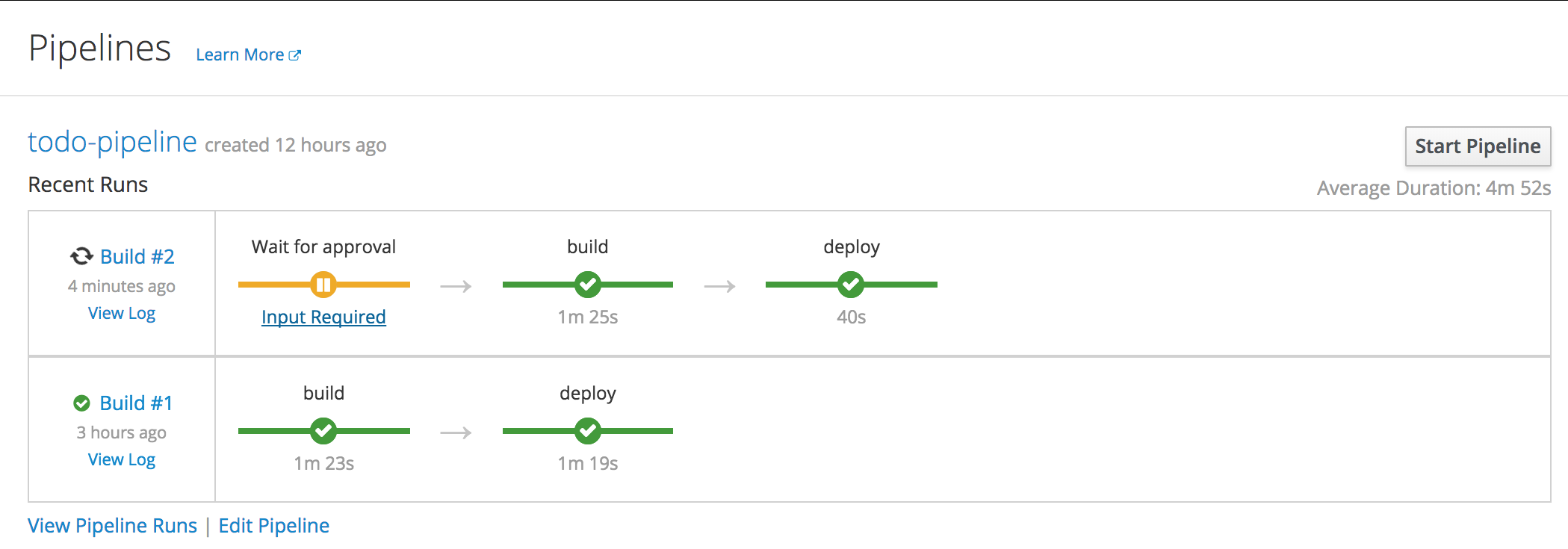
Setup the UAT environment
Create a project for UAT.
Important! Use the correct value of userX
oc new-project userX-uat
Give the “jenkins” service account the ability to invoke deployments in the UAT environment
Important! Use the correct value of userX
oc policy add-role-to-user edit system:serviceaccount:userX-dev:jenkins -n userX-uat
Give the default service account access to /assets/img/openshift_workshop in DEV environment
Important: in the command below, change the namespace “dev1-uat” to your uat project name and “dev1” to your dev project name.
Important! Use the correct value of userX
oc policy add-role-to-user system:image-puller system:serviceaccount:userX-uat:default --namespace=userX-dev
Import the following templates
- Using a notepad or vi, create a file named uat.yaml and paste the below contents to this file and save.
- Ensure you are in the uat project by checking what project you are in using the command
Important! Use the correct value of userX
apiVersion: v1
kind: Template
metadata:
creationTimestamp: null
name: uat
objects:
- apiVersion: v1
kind: PersistentVolumeClaim
metadata:
labels:
app: mongodb-persistent
template: mongodb-persistent-template
name: mongodb
spec:
accessModes:
- ReadWriteOnce
resources:
requests:
storage: 1Gi
- apiVersion: v1
kind: ImageStream
metadata:
labels:
app: todo
name: todo
spec:
lookupPolicy:
local: false
tags:
- annotations: null
from:
kind: DockerImage
name: 172.30.1.1:5000/userX-dev/todo:latest
generation: null
importPolicy: {}
name: latest
referencePolicy:
type: ""
- apiVersion: v1
data:
database-admin-password: ZGVtbw==
database-name: dG9kby1hcGk=
database-password: ZGVtbw==
database-user: ZGVtbw==
kind: Secret
metadata:
annotations:
template.openshift.io/expose-admin_password: '{.data[''database-admin-password'']}'
template.openshift.io/expose-database_name: '{.data[''database-name'']}'
template.openshift.io/expose-password: '{.data[''database-password'']}'
template.openshift.io/expose-username: '{.data[''database-user'']}'
labels:
app: mongodb-persistent
template: mongodb-persistent-template
name: mongodb
type: Opaque
- apiVersion: v1
kind: DeploymentConfig
metadata:
labels:
app: mongodb-persistent
template: mongodb-persistent-template
name: mongodb
spec:
replicas: 1
selector:
name: mongodb
strategy:
activeDeadlineSeconds: 21600
recreateParams:
timeoutSeconds: 600
resources: {}
type: Recreate
template:
metadata:
creationTimestamp: null
labels:
name: mongodb
spec:
containers:
- env:
- name: MONGODB_USER
valueFrom:
secretKeyRef:
key: database-user
name: mongodb
- name: MONGODB_PASSWORD
valueFrom:
secretKeyRef:
key: database-password
name: mongodb
- name: MONGODB_ADMIN_PASSWORD
valueFrom:
secretKeyRef:
key: database-admin-password
name: mongodb
- name: MONGODB_DATABASE
valueFrom:
secretKeyRef:
key: database-name
name: mongodb
image: centos/mongodb-32-centos7@sha256:a8186548488e545a7384913a3ea0503a4427b92cf17def2b5f60037180576b7c
imagePullPolicy: IfNotPresent
livenessProbe:
failureThreshold: 3
initialDelaySeconds: 30
periodSeconds: 10
successThreshold: 1
tcpSocket:
port: 27017
timeoutSeconds: 1
name: mongodb
ports:
- containerPort: 27017
protocol: TCP
readinessProbe:
exec:
command:
- /bin/sh
- -i
- -c
- mongo 127.0.0.1:27017/$MONGODB_DATABASE -u $MONGODB_USER -p $MONGODB_PASSWORD
--eval="quit()"
failureThreshold: 3
initialDelaySeconds: 3
periodSeconds: 10
successThreshold: 1
timeoutSeconds: 1
resources:
limits:
memory: 512Mi
securityContext:
capabilities: {}
privileged: false
terminationMessagePath: /dev/termination-log
terminationMessagePolicy: File
volumeMounts:
- mountPath: /var/lib/mongodb/data
name: mongodb-data
dnsPolicy: ClusterFirst
restartPolicy: Always
schedulerName: default-scheduler
securityContext: {}
terminationGracePeriodSeconds: 30
volumes:
- name: mongodb-data
persistentVolumeClaim:
claimName: mongodb
test: false
triggers:
- imageChangeParams:
automatic: true
containerNames:
- mongodb
from:
kind: ImageStreamTag
name: mongodb:3.2
namespace: openshift
type: ImageChange
- type: ConfigChange
- apiVersion: v1
kind: DeploymentConfig
metadata:
labels:
app: todo
name: todo
spec:
replicas: 1
selector:
deploymentconfig: todo
strategy:
activeDeadlineSeconds: 21600
resources: {}
rollingParams:
intervalSeconds: 1
maxSurge: 25%
maxUnavailable: 25%
timeoutSeconds: 600
updatePeriodSeconds: 1
type: Rolling
template:
metadata:
creationTimestamp: null
labels:
app: todo
deploymentconfig: todo
spec:
containers:
- env:
- name: PORT
value: "8080"
image: 172.30.1.1:5000/userX-dev/todo
imagePullPolicy: Always
name: todo
ports:
- containerPort: 8080
protocol: TCP
resources: {}
terminationMessagePath: /dev/termination-log
terminationMessagePolicy: File
dnsPolicy: ClusterFirst
restartPolicy: Always
schedulerName: default-scheduler
securityContext: {}
terminationGracePeriodSeconds: 30
test: false
triggers:
- imageChangeParams:
automatic: true
containerNames:
- todo
from:
kind: ImageStreamTag
name: todo:TestReady
namespace: userX-dev
type: ImageChange
- type: ConfigChange
- apiVersion: v1
kind: Service
metadata:
labels:
app: mongodb-persistent
template: mongodb-persistent-template
name: mongodb
spec:
ports:
- name: mongo
port: 27017
protocol: TCP
targetPort: 27017
selector:
name: mongodb
sessionAffinity: None
type: ClusterIP
- apiVersion: v1
kind: Service
metadata:
labels:
app: todo
name: todo
spec:
ports:
- name: 8080-tcp
port: 8080
protocol: TCP
targetPort: 8080
selector:
deploymentconfig: todo
sessionAffinity: None
type: ClusterIP
The yaml above was generated using the command: oc export pvc,is,secret,dc,svc –as-template=uat > uat.yml and removing the sections like status, creationTimestamp, runtime annotations, generation, and those objects we don’t want to create like jenkins related objects
- Ensure you are in the uat project by checking the output of the command below:
oc project
- Import the template
oc create -f uat.yaml
This will give an output similar to:
template "uat" created
- Create a new application based on the template
oc new-app uat
This will give an output similar to
--> Deploying template "dev2-uat/uat" to project dev2-uat
--> Creating resources ...
persistentvolumeclaim "mongodb" created
/assets/img/openshift_workshoptream "todo" created
secret "mongodb" created
deploymentconfig "mongodb" created
deploymentconfig "todo" created
service "mongodb" created
service "todo" created
--> Success
Application is not exposed. You can expose services to the outside world by executing one or more of the commands below:
'oc expose svc/mongodb'
'oc expose svc/todo'
Run 'oc status' to view your app.
- Expose the todo app to the public
oc expose svc todo
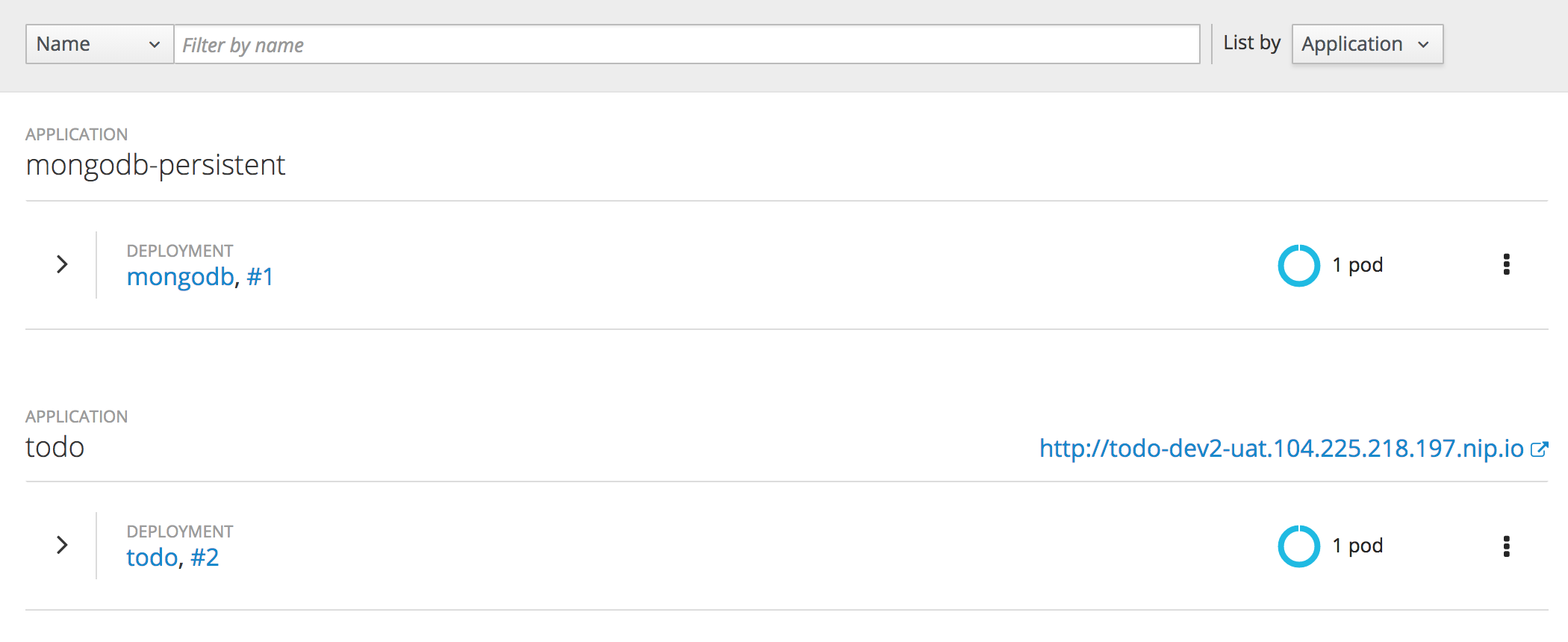
Configure the GitHook
- Login to Jenkins as your user id.
- Click on your UserId at the upper right hand corner.
- Click on Configure at the left hand navigation bar.
- Click on Show API Token. Take note of the “User ID” and “API Token”.
- Go to gogs page. Access the todoAPIjs repository -> Settings -> Git Hooks -> Post Receive. Paste the following script after substituting the user id and api token you got from Jenkins. The url should also be correct.
Instructor will show how to get the correct URL.
#!/bin/bash
USERID=<your jenkins userid>
TOKEN=<your jenkins token>
JENKINS_URL=<your jenkins url>
while read oldrev newrev ref
do
if [[ $ref =~ refs/tags ]];
then
echo "Master ref received. Deploying master branch to production..."
TAG=`echo $ref|sed 's#refs/tags/\(.*\)#\1#g'`
curl -v -k --user $USERID:$TOKEN -G "$JENKINS_URL/buildWithParameters" -d token=secret -d commit=$newrev -d tag=$TAG
else
echo "Ref $ref successfully received. Doing nothing: only the master branch may be deployed on this server."
fi
done
Configure Jenkins
- Login to Jenkins
- Click on todo-pipeline
- Click on Configure
- Tick “This Project is Parametrized”
- Add the following string parameters
- tag
- commit
- Tick “Trigger Builds Remotely”. Set the token to “secret” (without the quotes).
- Click Save
- Modify the pipeline script
node('nodejs') {
stage('build') {
sh """oc patch bc todo -p '{ "spec": { "source": { "git": { "ref": \"${params.tag}\" }}}}'"""
openshiftBuild(buildConfig: 'todo', showBuildLogs: 'true', commitID: params.commit)
}
stage( 'Wait for approval')
input( 'Aprove to production?')
stage('Deploy UAT'){
openshiftTag(sourceStream: 'todo', sourceTag: 'latest', destinationStream: 'todo', destinationTag: 'TestReady')
}
}
Test the Setup
Configure git email and username
- Execute the following commands to make sure git does not complain when you commit changes.
git config user.email "you@example.com"
git config user.name "Your Name"
Change something
- Edit views/index.ejs. Make changes like putting a string “This is a test” near the title.
- Execute the following commands:
git add views/index.ejs git commit -m "test" git tag TestReady-1.0 git push gogs TestReady-1.0 - After the push, you should be able to see something like this:
Counting objects: 7, done.
Delta compression using up to 4 threads.
Compressing objects: 100% (4/4), done.
Writing objects: 100% (4/4), 354 bytes | 0 bytes/s, done.
Total 4 (delta 2), reused 0 (delta 0)
remote: Master ref received. Deploying master branch to production...
remote: % Total % Received % Xferd Average Speed Time Time Time Current
remote: Dload Upload Total Spent Left Speed
remote: 0 0 0 0 0 0 0 0 --:--:-- --:--:-- --:--:-- 0* About to connect() to jenkins-dev1.xxx.xxx.xxx.xxx.nip.io port 443 (#0)
remote: * Trying xxx.xxx.xxx.xxx...
remote: * Connected to jenkins-dev1.xxx.xxx.xxx.xxx.nip.io (xxx.xxx.xxx.xxx) port 443 (#0)
remote: * Initializing NSS with certpath: sql:/etc/pki/nssdb
remote: * skipping SSL peer certificate verification
remote: * SSL connection using TLS_ECDHE_RSA_WITH_AES_128_GCM_SHA256
remote: * Server certificate:
remote: * subject: CN=*.xxx.xxx.xxx.xxx.nip.io
remote: * start date: Dec 19 05:45:18 2017 GMT
remote: * expire date: Dec 19 05:45:19 2019 GMT
remote: * common name: *.xxx.xxx.xxx.xxx.nip.io
remote: * issuer: CN=openshift-signer@1513662256
remote: * Server auth using Basic with user 'openshift-dev-admin'
remote: > GET /job/dev1/job/dev1-todo-pipeline/buildWithParameters?token=secret&commit=13311ffd0bb1138d8db492aa5ae9remote: 7cc9&tag=TestReady-1.0 HTTP/1.1
remote: > Authorization: Basic b3BlbnNoaWZ0LWRldi1hZG1pbjpmZjM1ZmU2ZjQ3OTdmY2FjODMwMDgzMDkzMTRkNTc3Nw==
remote: > User-Agent: curl/7.29.0
remote: > Host: jenkins-dev1.xxx.xxx.xxx.xxx.nip.io
remote: > Accept: */*
remote: >
remote: < HTTP/1.1 302 Found
remote: < Date: Wed, 20 Dec 2017 02:19:44 GMT
remote: < X-Content-Type-Options: nosniff
remote: < Location: https://jenkins-dev1.xxx.xxx.xxx.xxx.nip.io/job/dev1/job/dev1-todo-pipeline/
remote: < Content-Length: 0
remote: < Server: Jetty(9.4.z-SNAPSHOT)
remote: < Set-Cookie: f077bdd19e4769cc805d9c6fd3a63378=8825485b85ce65f504fc2e27c05ddbc6; path=/; HttpOnly; Secure
remote: <
remote: 0 0 0 0 0 0 0 0 --:--:-- --:--:-- --:--:-- 0
remote: * Connection #0 to host jenkins-dev1.xxx.xxx.xxx.xxx.nip.io left intact
To http://gogs-dev1.xxx.xxx.xxx.xxx.nip.io/corpbob/todoAPIjs.git
* [new tag] TestReady-1.0 -> TestReady-1.0
Observe the Pipeline Run
- Got to the dev environment and click on Builds->Pipelines. You should be able to see a new pipeline being started.

- Go to the Overview page of your dev environment, scroll to “todo” and observe the application being redeployed.
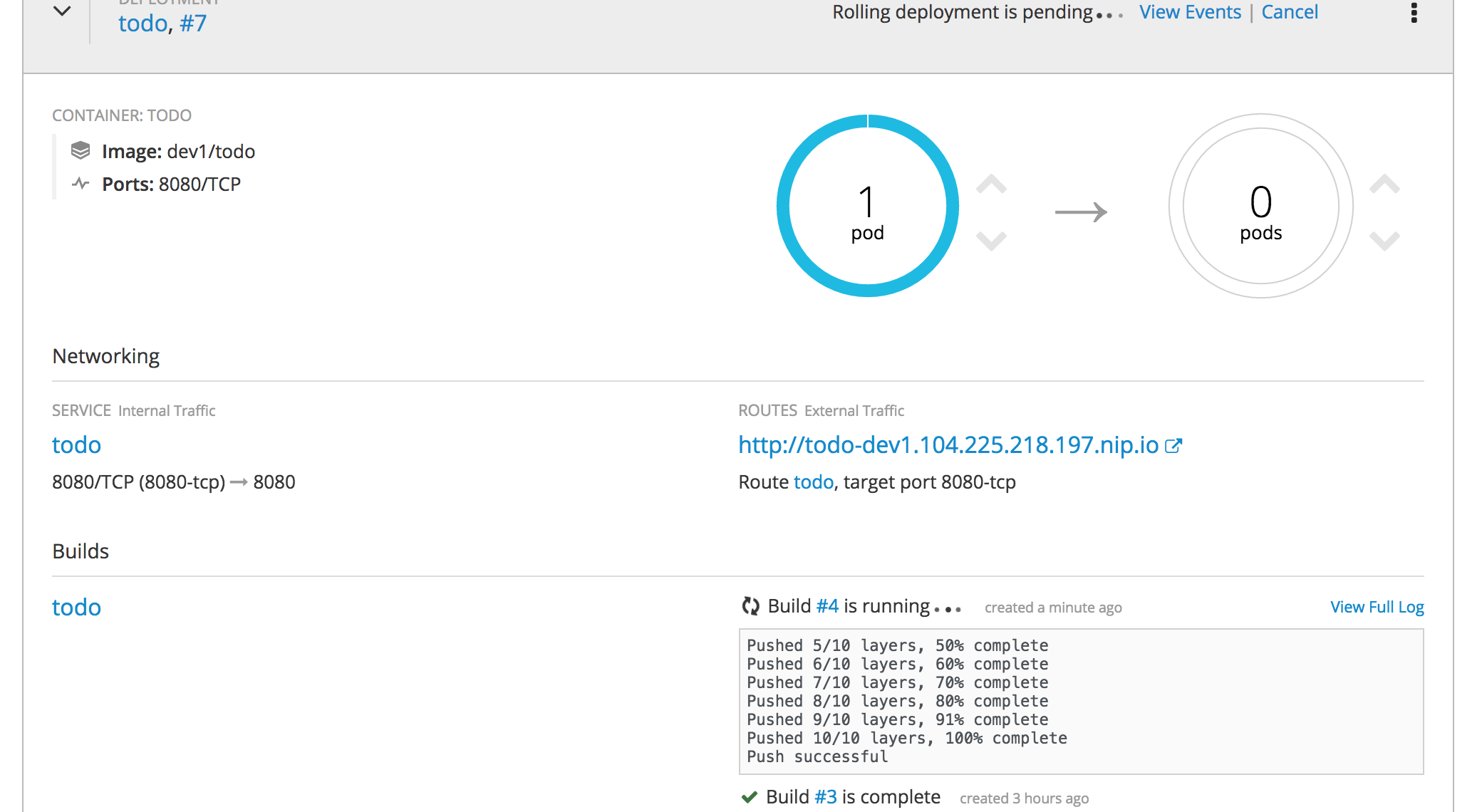
- After a while, the deployment will pause and will ask for input to proceed.

- Click on Input Required to open the Jenkins page and approve the request.
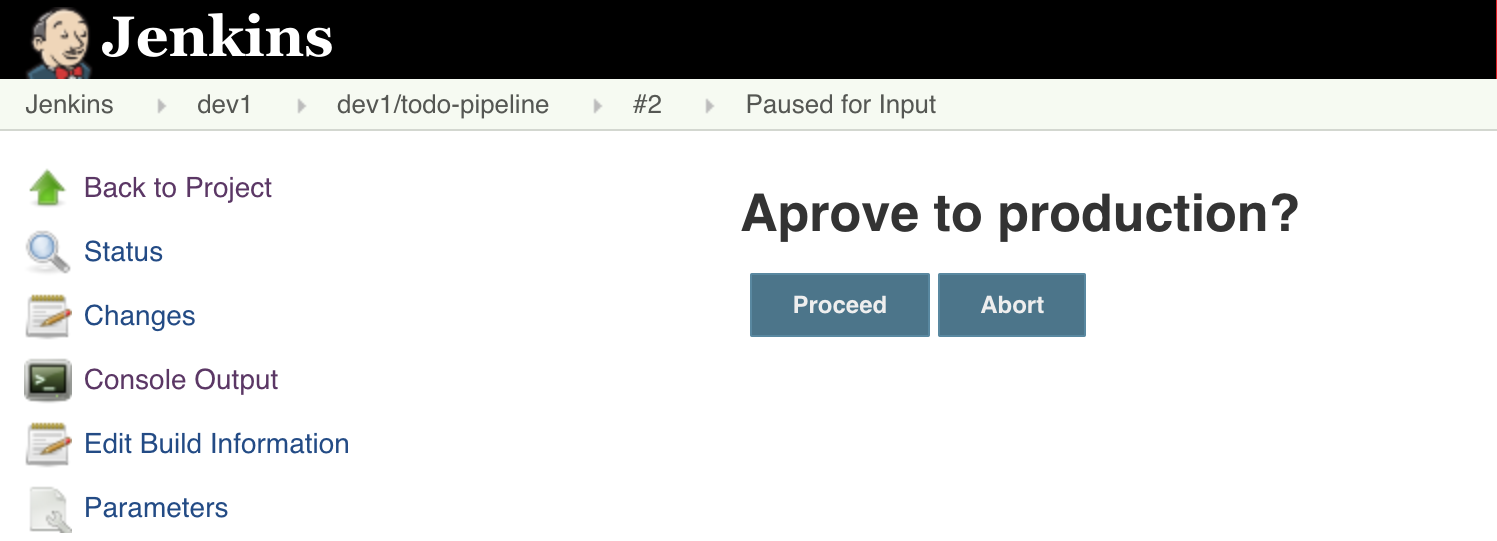
- Go to your UAT environment and watch “todo” being re-deployed.
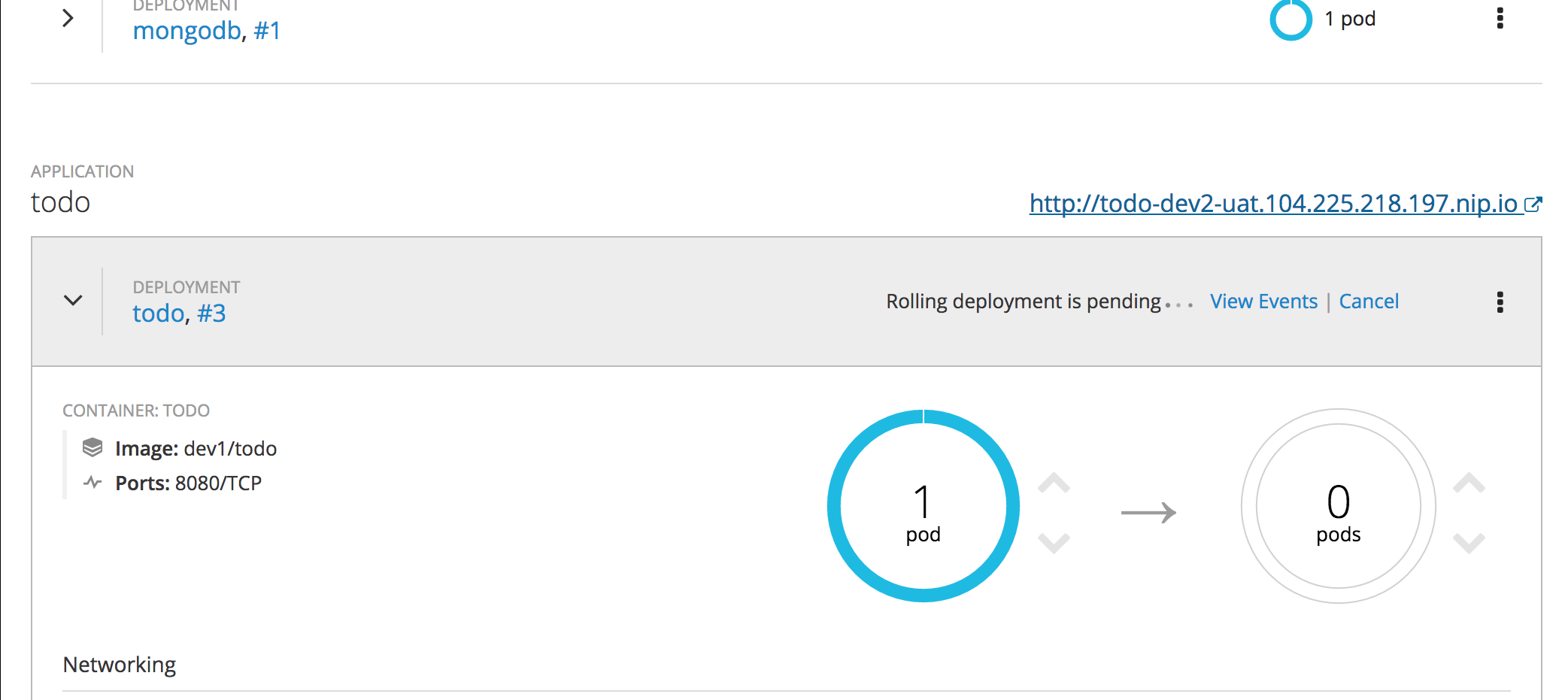
- Open the URL of todo in UAT and check that your changes are there.
